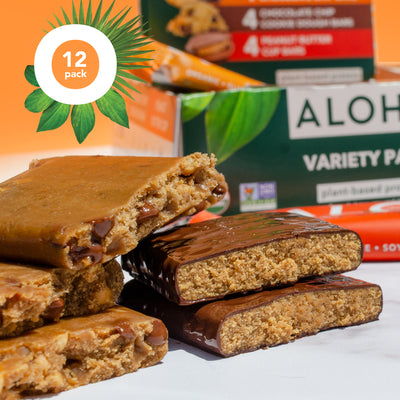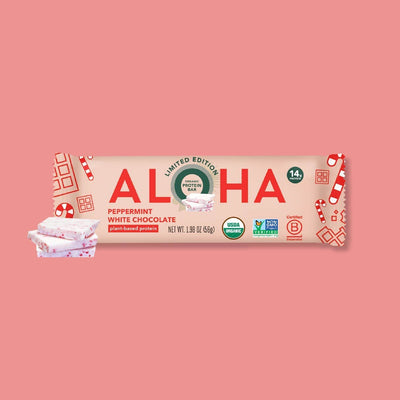Key Takeaways:
- Gradual Transition For Long-Term Success: Ease into a vegan diet by making small, manageable swaps in your meals to maintain balance and consistency.
- Focus On Nutritional Balance: Incorporate protein, iron, vitamin B12, and other key nutrients from plant-based sources to ensure you're meeting your nutritional needs.
- Sustainability And Health Benefits: A vegan diet promotes environmental sustainability while offering potential health benefits, such as improved heart health and weight management.
At ALOHA, we’re not just about plant-based nutrition—we live and breathe it. With organic, non-GMO products, we’re here to help make your wellness journey easier and more enjoyable.
Thinking about switching to a vegan diet but still trying to figure out where to start? Making this change can feel overwhelming, but it’s simpler than you might think when you break it down into manageable steps.
In this guide, we’ll break down the process of starting a vegan diet into simple, actionable steps that fit easily into your lifestyle. Whether you're making the switch gradually or going all in, we’ll provide helpful tips and strategies to ensure your transition is smooth, sustainable, and long-lasting.
What Is A Vegan Diet?
A vegan diet is a plant-based lifestyle that excludes all animal-derived products, such as meat, dairy, eggs, and honey. Instead, it focuses on nutrient-rich foods like fruits, vegetables, grains, legumes, and nuts. The core idea is to nourish the body with plant-based alternatives while avoiding anything from animals, promoting personal health and environmental sustainability.
Choosing a vegan diet is more than just cutting out certain foods—it’s about embracing a more mindful and ethical way of eating. This approach supports better physical health and aligns with concerns for animal welfare and reducing environmental impact. With so many diverse and delicious plant-based options, following a vegan diet is becoming easier and more rewarding for people on their wellness journeys.
Potential Benefits Of Starting A Vegan Diet
Starting a vegan diet can transform your health and contribute to a better planet. But what exactly are the benefits of this lifestyle? Here, we’ll break down some of the key advantages of adopting a vegan diet and how they can impact both your well-being and the environment:
Improved Heart Health
A vegan diet is often associated with better heart health. By eliminating animal products, you reduce the intake of saturated fats, which helps lower cholesterol levels. This, in turn, reduces the risk of heart disease, a leading cause of death worldwide.
Enhanced Digestion
The high fiber content in plant-based foods aids digestion and promotes a healthy gut. Whole grains, fruits, and vegetables are fiber-rich, which keeps your digestive system functioning smoothly. This can help prevent common issues like constipation and bloating while supporting long-term gut health.
Better Weight Management
Many people find that switching to a vegan diet helps them maintain a healthy weight. Plant-based foods tend to be lower in calories while providing plenty of nutrients. This means you can feel full and satisfied without overeating, making weight management easier without strict calorie counting.
Environmental Sustainability
A vegan diet is good for your body and the planet. Raising livestock for food uses significant resources like water and land while contributing to greenhouse gas emissions. By choosing plant-based meals, you can help reduce your carbon footprint and support a more sustainable food system.
Animal Welfare
Beyond health and environmental benefits, many people choose veganism to support animal welfare. The diet avoids all animal exploitation, which aligns with ethical concerns about factory farming and animal rights. It’s a compassionate choice for those who want to live according to their values.
Steps To Transition To A Vegan Diet
Transitioning to a vegan diet can be simple and rewarding if approached with the right mindset. Whether making gradual changes or committing to an immediate switch, taking small, intentional steps will set you up for long-term success. Below, we’ll explore different approaches to help you get started:
Gradual Transition vs. Immediate Switch
There’s no one-size-fits-all approach to going vegan. Some people prefer to slowly phase out animal products over time, while others jump right in. Both methods work—it’s about finding what feels best for you and your lifestyle.
Start By Swapping Out Animal Products
A great first step is to replace familiar animal-based foods with plant-based alternatives. For instance, try using almond or oat milk in your coffee instead of dairy milk, or swap your regular yogurt for a coconut-based version. Gradually swapping these items will help you ease into your new diet without feeling deprived.
Focus On Plant-Based Meals You Already Love
Chances are, you’re already enjoying some vegan-friendly meals without realizing it! Dishes like pasta with marinara, veggie stir-fries, or oatmeal with fruits and nuts are naturally plant-based. Build on the meals you already love to make the transition feel less intimidating.
Educate Yourself On Nutritional Needs
While a vegan diet can provide all the nutrients your body needs, it’s important to be mindful of essential nutrients like protein, iron, and vitamin B12. Educating yourself about plant-based sources of these nutrients will help you maintain a well-balanced diet. Items like beans, lentils, tofu, and fortified plant milks are excellent vegan protein sources and other vital nutrients.
Planning Balanced Vegan Meals
Planning balanced vegan meals is key to maintaining a healthy and sustainable diet. By focusing on various whole, plant-based foods, you can ensure you’re getting the essential nutrients your body needs. Let’s break down how to structure your meals for optimal nutrition:
Include A Protein Source
Protein is crucial for muscle repair and overall health; plenty of plant-based options exist. Beans, lentils, tofu, tempeh, and quinoa are all excellent vegan protein sources. Include at least one of these in every meal to stay energized and full.
Prioritize Fiber-Rich Foods
Fiber is vital for digestion, and vegan diets are naturally rich in it. Whole grains like brown rice, oats, quinoa, vegetables, and fruits are great sources. These foods help keep your gut healthy and promote regularity while helping you feel fuller for longer.
Don’t Forget Healthy Fats
Incorporating healthy fats into your meals is essential for brain function, heart health, and overall energy levels. Avocados, nuts, seeds, and olive oil are perfect for adding good fats to your diet. Including a small portion of these fats in each meal can help balance your vegan diet and improve nutrient absorption.
Common Nutrient Considerations In A Vegan Diet
When starting a vegan diet, there are a few essential nutrients you should pay extra attention to to stay balanced and healthy. Below, we’ll cover some of the most important considerations and how to ensure you're getting what you need:
- Protein: While vegan diets provide plenty of protein options, it’s essential to be mindful of incorporating various sources. Beans, lentils, chickpeas, tofu, and quinoa are all excellent options. Eating a range of these foods ensures you get all the essential amino acids your body needs for muscle maintenance and overall health.
- Vitamin B12: Vitamin B12 is primarily found in animal products, so vegans need to seek fortified foods or supplements. You can find B12 in fortified plant milks, cereals, and nutritional yeast. Including these in your diet or taking a supplement can help you avoid a deficiency, which is crucial for energy and brain function.
- Iron: Iron is another essential nutrient to monitor, especially since the body absorbs plant-based sources less easily. Foods like lentils, chickpeas, spinach, and fortified cereals are rich in iron, but pairing them with vitamin C-rich foods, like citrus or bell peppers, can help boost absorption.
- Omega-3 Fatty Acids: These essential fats are important for brain health and reducing inflammation. While fish is a common source, vegans can get omega-3s from flaxseeds, chia seeds, walnuts, and algae-based supplements. Including these foods regularly helps support heart and brain function.
- Calcium: Calcium is crucial for bone health, and while it’s commonly associated with dairy, many plant-based options are rich in calcium, too. Leafy greens like kale, broccoli, fortified plant milks, and tofu are excellent sources. Incorporating these into your diet will help maintain strong bones.
- Vitamin D: Vitamin D supports immune function and helps your body absorb calcium. Since it’s not widely available in plant-based foods, it’s essential to spend time in sunlight, consume fortified foods like plant milks, or take a supplement, especially during winter.
Tips For Staying On Track With Your Vegan Journey
Staying committed to a vegan diet can be challenging at times, especially when faced with cravings, social situations, or busy schedules. However, staying on track is possible with the right mindset and some practical strategies. Here are some tips to help you maintain your vegan journey with ease:
Stay Educated And Inspired
Continuously learning about the benefits of veganism—whether for personal health, environmental impact, or animal welfare—plays a crucial role in keeping you on track. Engage with plant-based blogs, watch documentaries, or listen to podcasts that reinforce the positive aspects of this lifestyle. Being part of vegan communities, either online or in person, can also provide support, new ideas, and motivation for your journey.
Plan Your Meals Ahead
Planning your meals in advance can significantly improve your adherence to a vegan diet. When you have a clear meal plan and the right ingredients on hand, you’re less likely to reach for quick, non-vegan convenience foods. Meal prepping also saves time during busy weekdays and ensures you consistently eat nutritious, balanced meals that fuel your body.
Find Vegan Substitutes For Your Favorite Foods
When cravings hit, don’t worry—there’s likely a vegan substitute for almost any dish you love. Whether it's burgers, pizzas, or creamy sauces, plant-based alternatives have made it easier to stay on track with a vegan diet. Brands like ALOHA provide high-quality plant-based protein products, perfect for those moments when you want something familiar but still vegan-friendly.
Allow Flexibility And Celebrate Progress
Adopting a rigid approach can make any lifestyle change feel overwhelming, and veganism is no different. If you occasionally slip or find it challenging to stay 100% on track, be kind to yourself and celebrate your progress rather than dwelling on mistakes. Allowing room for flexibility can make the experience more sustainable and enjoyable, leading to long-term success with a vegan lifestyle.
Final Thoughts
Starting a vegan diet is more than just a dietary change; it's a commitment to a healthier, more sustainable, and ethical way of living. By focusing on plant-based foods, you not only nourish your body but also make a positive impact on the environment and animal welfare. The shift to veganism is a personal journey that allows you to explore diverse, nutritious, and delicious food options that align with your values.
As you embrace this lifestyle, it's important to approach it with flexibility and mindfulness. The key is making choices that work for you and gradually incorporating more plant-based meals into your routine while ensuring you meet your nutritional needs. With the growing availability of vegan-friendly products and resources, adopting and thriving on a vegan diet has never been more accessible or rewarding. This journey is not just about what you eat—it's about the positive changes you can make for yourself and the world around you.
Read also:
- Vegan Vs Dairy-Free: What Does Vegan Really Mean?
- How To Cut Dairy Out Of Your Diet And Enjoy Delicious Alternatives
- Are Protein Shakes Good For Weight Loss?
Frequently Asked Questions About How To Start A Vegan Diet
What are the first steps to start a vegan diet?
Gradually incorporate more plant-based foods into your meals, such as fruits, vegetables, grains, and legumes. Start with small swaps, like using almond milk instead of dairy or choosing plant-based proteins like tofu or lentils.
Is it challenging to transition to a vegan diet?
Transitioning to a vegan diet can be as easy or challenging as you make it. Some people prefer to make gradual changes, replacing one meal at a time with vegan options, which can help make the shift feel more manageable.
What common nutrients do I need to focus on when going vegan?
It's crucial to ensure you’re getting enough protein, vitamin B12, iron, calcium, and omega-3 fatty acids on a vegan diet. These can be found in foods like beans, fortified plant milks, leafy greens, and seeds.
How can I ensure I get enough protein on a vegan diet?
On a vegan diet, you can easily meet your protein needs by eating various plant-based foods such as beans, lentils, tofu, tempeh, and quinoa. Including different protein sources in your meals will help you stay energized and full.
Are there any health risks associated with starting a vegan diet?
A well-planned vegan diet can be healthy, but it’s essential to be mindful of potential nutrient deficiencies, particularly vitamin B12, iron, and omega-3s. Regularly consuming fortified foods or supplements can help prevent these deficiencies.
What are some vegan alternatives to dairy products?
Vegan alternatives to dairy products include almond, soy, oat milk, and plant-based cheeses made from nuts and seeds. These products are now widely available and can easily replace their dairy counterparts.
Can I eat out at restaurants on a vegan diet?
Yes, many restaurants now offer vegan options, and chefs are often willing to modify dishes to fit your dietary needs. Researching menus ahead of time or asking about substitutions can make dining out easier.
Will a vegan diet help with weight loss?
A vegan diet may support weight loss because plant-based foods are generally lower in calories and higher in fiber, which helps you feel full longer. However, focusing on whole, unprocessed foods is essential for the best results.
Is a vegan diet more expensive than a regular diet?
A vegan diet can be affordable, especially if you focus on whole foods like beans, grains, and vegetables. While processed vegan foods can be costly, cooking at home with simple ingredients can save money.
How do I handle social situations when starting a vegan diet?
Handling social situations as a new vegan involves clear communication about your dietary choices. You can also bring your own vegan dish to gatherings or suggest restaurants with vegan-friendly options to make it easier.
Sources:
1. Gibbs, J., & Cappuccio, F. P. (2022). Plant-Based Dietary Patterns for Human and Planetary Health. Nutrients, 14(8), 1614. https://doi.org/10.3390/nu14081614
2. Sabaté, J., & Soret, S. (2014). Sustainability of plant-based diets: back to the future. The American Journal of Clinical Nutrition, 100(1), 476S482S. https://doi.org/10.3945/ajcn.113.071522
3. Salehin, S., Rasmussen, P., Mai, S., Mushtaq, M., Agarwal, M., Hasan, S. M., Salehin, S., Raja, M., Gilani, S., & Khalife, W. I. (2023). Plant Based Diet and Its Effect on Cardiovascular Disease. International Journal of Environmental Research and Public Health, 20(4), 3337. https://doi.org/10.3390/ijerph20043337
4. Koutentakis, M., Surma, S., Rogula, S., Filipiak, K. J., & Gąsecka, A. (2023). The Effect of a Vegan Diet on the Cardiovascular System. Journal of Cardiovascular Development and Disease, 10(3), 94. https://doi.org/10.3390/jcdd10030094
5. Dreher, M. (2018). Whole Fruits and Fruit Fiber Emerging Health Effects. Nutrients, 10(12), 1833. https://doi.org/10.3390/nu10121833
6. Łuszczki, E., Boakye, F., Zielińska, M., Dereń, K., Bartosiewicz, A., Oleksy, Ł., & Stolarczyk, A. (2023). Vegan diet: nutritional components, implementation, and effects on adults’ health. Frontiers in Nutrition, 10. https://doi.org/10.3389/fnut.2023.1294497
ALOHA's products are not intended to treat, diagnose, mitigate, prevent, or cure disease. ALOHA's products should not replace prescribed medications or the variety of foods important to a healthful diet.
Do not self-diagnose any health condition. Work with your healthcare provider to determine how best to achieve optimal health.











